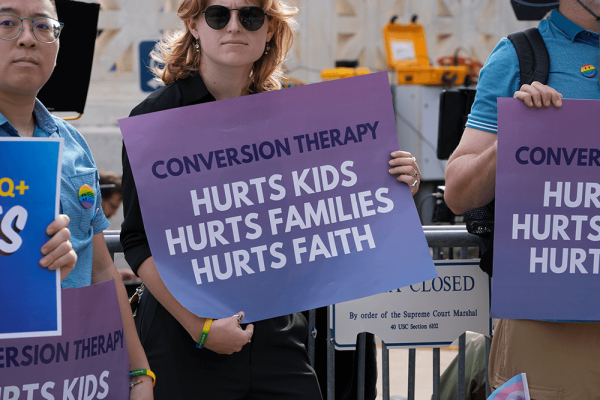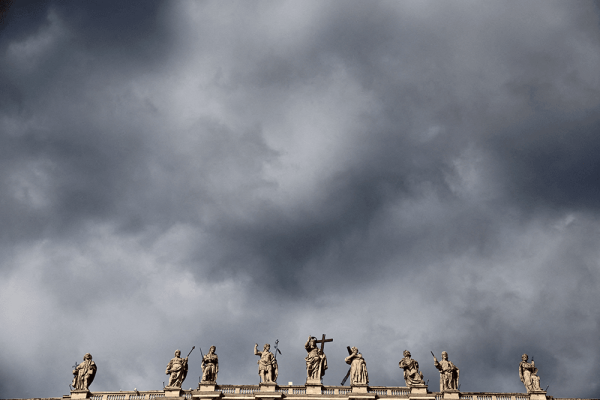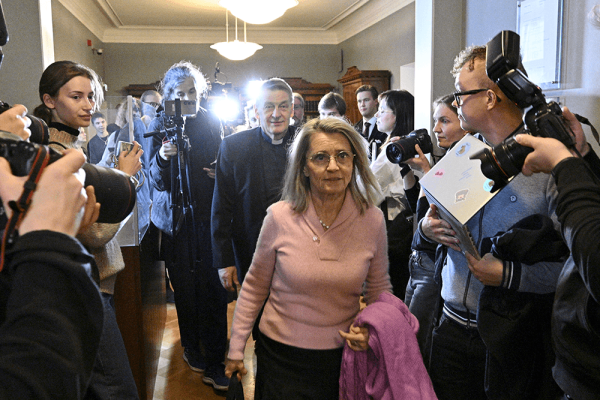Deeply flawed and alarming. That was my reaction last week as I read the leaked draft of the Supreme Court opinion that would repeal Roe v. Wade, unravelling nearly 50 years of judicial precedent and placing abortion rights into the hands of state lawmakers.
If the final ruling mirrors this leaked draft, as many as 28 states are likely to outright ban or severely limit abortion rights. This decision would deeply impact women and pregnant people, especially low-income people and people of color who will be disproportionately harmed.
As a Christian, I believe we must protect the rights of women and pregnant people to make their own reproductive health decisions, a right that has been protected since 1973 by the Supreme Court as a fundamental liberty under the 14th Amendment. As a Christian, I also want to ensure there are fewer unwanted pregnancies by ensuring everyone has access to holistic health care and the economic support to care for their children. I wish these two sentences weren’t so controversial, but they are.
To many on the Right, my support for women’s rights sounds like I’m dismissing concerns about the rights of an unborn child. To many on the Left, acknowledging that I want to decrease the number of abortions sounds like a slippery slope argument that will result in the erosion of the right to choose and will further stigmatize those who elect to have an abortion. But like many Americans, my views on abortion are complex, comprising a both/and perspective that’s been increasingly unable to find a home in our polarized politics.
Last week’s leaked draft — and the probable reversal of Roe v. Wade it foreshadows — makes it imperative that those of us who hold a both/and view become more vocal: We must oppose extreme measures that would eliminate the right of women and pregnant people to choose whether they bear children while we also advocate vigorously for policies and programs that would dramatically reduce the need for unwanted pregnancies that lead people to seek abortions in the first place. These policies include: ensuring everyone has affordable access to quality health care and contraception; reducing and eliminating gender-based discrimination and violence; and expanding economic support to women, parents, and families — including the pro-family policies stalled in Congress that would alleviate many of the economic stresses that prompt people to seek abortions.
Lately I’ve been thinking about these words from the Apostle Paul: “Do not conform to the pattern of this world, but be transformed by the renewing of your mind. Then you will be able to test and approve what God’s will is—his good, pleasing and perfect will” (Romans 12:2). These words remind me that Christians are called to be countercultural, which often requires us to resist and transform the broken and falsely binary choices our culture puts forward. Jesus modeled this continually, challenging the hypocrisy of religious leaders’ overly black-and-white worldview on everything from healing on the Sabbath (Luke 13:10-17) to charitable giving that neglects deeper justice (Matthew 23:23).
With Jesus’ example in mind, we first must be attuned to the ramifications our policy decisions will have on people. For example, banning abortion outright in many states will force those seeking abortions to travel to states in which it is legal; those without means to travel may take desperate measures that jeopardize their health. People who want to ban abortion must reconcile with the reality that many countries with the most restrictive abortion laws also have the highest rates of abortion.
At the same time, Jesus’ example also prompts us to resist the urge to demonize those who disagree with us, recognizing that even as Christians we can arrive at very different conclusions as we interpret and apply the same scriptures. Many political and religious leaders today often present “pro-choice” and “pro-life” as a mutually exclusive binary, characterizing anyone who disagrees with their favored side as immoral or even evil. But Americans’ perspectives on abortion are much more complex. Recent polling from Pew Research Center found that most Americans hold a combination of views typically ascribed to the “pro-choice” and “pro-life” perspectives. Pew’s survey found that only 8 percent of U.S. adults believe abortion should be illegal in all cases without exception; similarly, only 19 percent of adults believe abortion should be legal in all cases without exception. By contrast, 71 percent of those surveyed said they believed there were some instances in which abortion should be legal and other instances where it shouldn’t be legal. This aligns with earlier Pew findings data showing that 70 percent of U.S. adults and 59 percent of U.S. Christians oppose the Supreme Court overturning Roe v. Wade.
Thus, most Americans have a more nuanced position than the current debate implies, but the “us versus them” mindset and increasingly zero-sum nature of our politics doesn’t have much use for complexity. As is the case with many other issues, the most strident voices and extreme positions are setting the terms of the debate, which is why nine states have tried (and Texas succeeded) to pass laws making abortion illegal without exceptions for cases of rape or incest. These extreme positions do not reflect the perspective of many people who hold a pro-life perspective. Access to abortion without any restrictions also fails to reflect the perspective of most of those who hold a pro-choice perspective.
My own story is just one example of how our views can change and how more nuanced views have a hard time finding a place in our polarized politics. I came of age just before the advent of the internet — and just as the Religious Right started dominating perceptions of U.S. Christianity. I don’t remember abortion ever being discussed or addressed directly within the mainline churches that I grew up attending. At the time, if you asked me what I thought about abortion, I would have said that everyone should have the freedom to control their own body, including women and others who are pregnant. My answer would have been more of a political and ethical one, rather than a religious once since I hadn’t reflected deeply on how my faith informed my perspective.
By the time I arrived in high school in the early ’90s, however, abortion had become a central wedge issue in U.S. politics. This did not happen by accident: After the Religious Right realized that their initial focus on protecting Christian schools and colleges from being forced to desegregate became politically untenable, they turned to abortion as their galvanizing cause.
However, it wasn’t the Religious Right that made me appreciate the complex theological and moral issues at stake in abortion; it was becoming a father. When my wife became pregnant with our first son, Joshua, I witnessed every stage of pregnancy, including the poignant moment when my wife and I heard our son’s heartbeat for the first time. I was overwhelmed with emotion in that moment by the miracle of life and gained a greater appreciation for the complex moral and ethical decisions that would be involved in stopping that heartbeat.
Today, I try to embrace and live out a commitment to a consistent ethic of life — a commitment that Sojourners has also embraced over its history. In terms of reproductive health, that means I am against the criminalization of abortion services and support efforts to dramatically reduce the numbers of abortion in the United States. I believe we must protect the dignity and sanctity of life at every stage of life, always challenging the hypocrisy of some parts of the pro-life movement who have been more pro-birth than consistently pro-life. A consistent ethic of life requires that we care about everything that harms and threatens people’s lives and dignity, from poverty and a lack of health care to climate change and gun violence, and more.
As Christians, our response to any controversial issue must always be defined by love — a love that refuses to hate or write off those who hold very different political or theological perspectives. If the Supreme Court does indeed overturn Roe v. Wade, as the leaked memo indicates, the decision will continue to pull our nation apart at its seams. This moment calls for a pastoral approach to care for anyone facing an unwanted pregnancy, protecting their rights while simultaneously reframing what it means to protect life and dignity for all. It is my hope and prayer that the majority of Americans who hold a both/and view can help bridge our growing divide by resisting extreme positions and working to ensure that abortion is kept legal, even as we pursue evidence-based ways of making it more rare.
Got something to say about what you're reading? We value your feedback!







